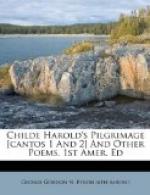TO IANTHE. {1}
Not in those climes where I have
late been straying,
Though Beauty long hath there been
matchless deemed,
Not in those visions to the heart
displaying
Forms which it sighs but to have
only dreamed,
Hath aught like thee in truth or
fancy seemed:
Nor, having seen thee, shall I vainly
seek
To paint those charms which varied
as they beamed —
To such as see thee not my words
were weak;
To those who gaze on thee, what language could they
speak?
Ah! mayst thou ever be what now
thou art,
Nor unbeseem the promise of thy
spring,
As fair in form, as warm yet pure
in heart,
Love’s image upon earth without
his wing,
And guileless beyond Hope’s
imagining!
And surely she who now so fondly
rears
Thy youth, in thee, thus hourly
brightening,
Beholds the rainbow of her future
years,
Before whose heavenly hues all sorrow disappears.
Young Peri of the West!—’tis
well for me
My years already doubly number thine;
My loveless eye unmoved may gaze
on thee,
And safely view thy ripening beauties
shine:
Happy, I ne’er shall see them
in decline;
Happier, that while all younger
hearts shall bleed
Mine shall escape the doom thine
eyes assign
To those whose admiration shall
succeed,
But mixed with pangs to Love’s even loveliest
hours decreed.
Oh! let that eye, which, wild as
the gazelle’s,
Now brightly bold or beautifully
shy,
Wins as it wanders, dazzles where
it dwells,
Glance o’er this page, nor
to my verse deny
That smile for which my breast might
vainly sigh,
Could I to thee be ever more than
friend:
This much, dear maid, accord; nor
question why
To one so young my strain I would
commend,
But bid me with my wreath one matchless lily blend.
Such is thy name with this my verse
entwined;
And long as kinder eyes a look shall
cast
On Harold’s page, Ianthe’s
here enshrined
Shall thus be first beheld, forgotten
last:
My days once numbered, should this
homage past
Attract thy fairy fingers near the
lyre
Of him who hailed thee, loveliest
as thou wast,
Such is the most my memory may desire;
Though more than Hope can claim, could Friendship
less require?
CANTO THE FIRST.
I.
Oh, thou, in Hellas deemed of heavenly
birth,
Muse, formed or fabled at the minstrel’s
will!
Since shamed full oft by later lyres
on earth,
Mine dares not call thee from thy
sacred hill:
Yet there I’ve wandered by
thy vaunted rill;
Yes! sighed o’er Delphi’s
long-deserted shrine
Where, save that feeble fountain,
all is still;
Nor mote my shell awake the weary
Nine
To grace so plain a tale—this lowly lay
of mine.




